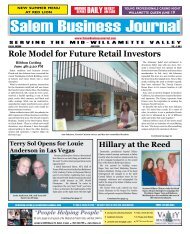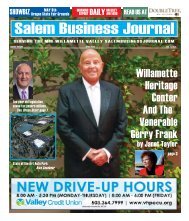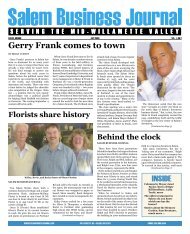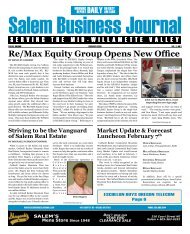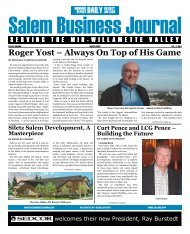KATU TV-2's Melica Johnson Covers Salem - Salem Business Journal
KATU TV-2's Melica Johnson Covers Salem - Salem Business Journal
KATU TV-2's Melica Johnson Covers Salem - Salem Business Journal
You also want an ePaper? Increase the reach of your titles
YUMPU automatically turns print PDFs into web optimized ePapers that Google loves.
april 2008 <strong>Salem</strong> <strong>Business</strong> <strong>Journal</strong> page 1<br />
ChanDlER...Continued from page 1<br />
most common asset allocation models also<br />
tend to ignore personal residences--which<br />
are often the largest and best investment an<br />
individual can make in his or her lifetime-as<br />
apart of the investment portfolio. These<br />
asset allocation models also tend to disregard<br />
individual income taxes and functionality, and<br />
don’t account for real-life issues like the need<br />
for short term liquidity and protecting against<br />
factors such as inflation and deflation. And<br />
finally, they don’t account for the flexibility<br />
needed by individuals whose investment<br />
horizons are impacted by factors like death,<br />
disability and divorce. Asset allocation is<br />
a powerful tool in adding control to your<br />
financial life, but in order for it to benefit you<br />
the most, you’ll have to allocate assets based<br />
on your individual situation, not some onesize-fits-all<br />
template.<br />
A good financial plan is another way that<br />
you can exert control over your financial life.<br />
If you’re working with a financial advisor,<br />
choose an individual who will help you develop<br />
a customized plan. Many people who call<br />
themselves financial consultants or financial<br />
planners are not acting in the client’s best<br />
interest. They’re salespeople, not fiduciaries.<br />
Make sure to choose wisely.<br />
Income is often the weakest point in most<br />
people’s financial life, and is where financial<br />
dysfunction begins. Recognize that your<br />
income is within your control. The bottom line<br />
is that if you aren’t charging enough, you’re not<br />
earning enough. Whitehead advises creating<br />
value by applying your skills and expertise<br />
to the information and data that is readily<br />
available to the general public. If you provide<br />
what is already readily accessible, your value<br />
will not be as high.<br />
It’s also very important to understand your<br />
level of risk tolerance. Your risk tolerance<br />
actually has more to do with who you are than<br />
what can and will happen to your portfolio.<br />
While there are numerous questionnaires<br />
and forms utilized by the financial industry to<br />
determine someone’s risk tolerance, it simply<br />
isn’t that easy to determine. Find a financial<br />
professional that will work with you to discover<br />
your true risk tolerance and help you to develop<br />
an investment portfolio that’s congruent with<br />
the other risks and responsibilities in your life.<br />
Risk tolerance can be assessed by evaluating<br />
factors like how much you save, whether or<br />
not you’re self employed and whether or not<br />
you have a family or other dependents that<br />
rely on you for support.<br />
Finally, take control over how well you<br />
understand the way your finances and<br />
investments work. Surprisingly, Whitehead<br />
finds that many of his clients need to spend<br />
Continued on page 20<br />
Lisa Franceschi 503-589-9150 lisa@withnellauto.com



